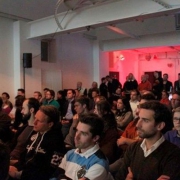The world needs more 007s

When you look for successful companies who have somewhere more than 25-50 employees, you will find about 400,000 companies. And when we assume about 6 billion adults you will come to 0.007% of people founding, co-founding and running those companies. Entrepreneurs are clearly a extremely rare minority. Now – the number is obviously dominated by the developed nations who have a culture of business builders. One may think also a much better education system. But the argument of education is not quite holding. Most of the successful entrepreneurs actually quit school before graduation and just started their company. Many of today’s or even yesterday’s entrepreneurs did not come from a wealthy family or from a family with entrepreneurial background or had a great education. Researching the background of hundreds of entrepreneurs we worked with made it pretty clear: The only pattern is no pattern.
How Many More Hidden Gems are there?
Now the most interesting question arises: How many of those hidden gems do we have all over Africa, Asia, Latin America, Eastern Europe and the rest of the world?
At the World Innovations Forum we are looking especially for that minority of often laughed at, crazy people with amazing ideas that seem to be completely unrealistic. We are not necessarily looking for people who want to start a company but also those who would love to become a co-founder or work in a startup like environment in a corporate innovation lab.
Test Your Entrepreneurial DNA
If you like to know whether you maybe a good entrepreneur or a good co-founder or somebody living your entrepreneurial dream in a corporate innovation lab, do your your test. This project is not funded by any corporation. Therefor we need to fund it ourselves and ask for $2.50 to contribute to the WIForum organization. You will win regardless. If you know you are an entrepreneur, great, if you know you are probably not, you can safe time and money from trying and if you still want to try – you actually should anyway.
After you completed the test we will review it and let you know. Those who appear to be especially talented will be invited to an interview to possibly join the WIForum Entrepreneurum, a special entrepreneurship preparation program that may lead to an entry into the Innopreneurs Academy.
Join the Innopreneurs Academy
The Innopreneurs Academy will work with participants deeply on innovation design, creating ground breaking innovation and building their company within a six month period. The developed world was built on the shoulders of a handful of amazing entrepreneurs. We see no reason to experience the same in all nations. The only difference we are looking at: Don’t make the same mistakes the old world did and grow monster companies that can no longer innovate. Instead build highly specialized highly connected enterprises where many other enterprises deliver specialized parts or services. Economies with a small number of monster organizations are doomed to fail, while highly agile economies with lots of innovative companies collaborating show the most stable societies.
NOTE: this concept may look completely contradicting the idea of inclusion. But in the case of entrepreneurship we cannot circumvent mother nature. There are only so many talents on earth – but we want to include all of them. Democratizing entrepreneurship.

 Africa, most of South East Asia and Latin America has showed phenomenal progress in education already; having 1,000 times more academic graduates than 50 years ago. There are now thousands of Universities across those continents, which created millions of well trained people – but with no equivalent job. What would a math degree do if you can’t work with it? Today there are more than a million graduates in in each of the three continents. The best they can do would be try to get to Europe or the US. Yet – that would be a devastating brain drain and remove all hopes, those nations have today. Before the inception of development aid, education was a function of having better employees to handle the jobs – but here we have better education but no jobs. We realized we needed to find out how exactly did developed countries develop.
Africa, most of South East Asia and Latin America has showed phenomenal progress in education already; having 1,000 times more academic graduates than 50 years ago. There are now thousands of Universities across those continents, which created millions of well trained people – but with no equivalent job. What would a math degree do if you can’t work with it? Today there are more than a million graduates in in each of the three continents. The best they can do would be try to get to Europe or the US. Yet – that would be a devastating brain drain and remove all hopes, those nations have today. Before the inception of development aid, education was a function of having better employees to handle the jobs – but here we have better education but no jobs. We realized we needed to find out how exactly did developed countries develop. In the early and mid 1800’s, Switzerland was the poorest country in Europe. Germany was a poor country, South Korea was one of the poorest countries in Asia, California was a desert and the most western farmland in the US. If not for the Gold, California would hardly be on the map. Yet the natural resources died out quickly. A similar risk the Arabian peninsula is facing. However something changed above and beyond natural resources and tourism: Innovation and entrepreneurship. When Carl Benz, Robert Bosch, Werner v. Siemens and Friedrich Krupp, crazy entrepreneurs with useless ideas, started to engineer, develop, produce, market, sell and scale their businesses, Germany became a wealthy nation. There is nothing else that propelled the German economy as much as these crazy entrepreneurs. At the same time period, Alfred Escher wanted to build a railroad in Switzerland. But since this was a low priority for the very poor Swiss population, he could not raise any capital. So he asked for foreign investment, the sheer amount he raised, required him to create a more international bank, Credit Suisse. Since he needed more talent, he created the Zürich based University, ETH, today one of the most renowned Tech Universities in the world. Did you know the jet engine was invented in France? Now you know why France is still one of the world’s leading aerospace nations. Did you know that Silicon Valley was essentially based on five entrepreneurs? Almost all developed countries started poor, had an environment where crazy entrepreneurs just could do their thing, no matter how useless and money could flow in from foreign investors. The US, Germany, Switzerland, South Korea, Japan, and all others have been based on that very principle. Thousands of years before that it was war, theft and the financing of their armies to do the very same: invent, grow, sell and come to prosperity. Since thousands of years, the nations that carried their goods in foreign countries and received investment from foreign countries rose. And there is no reason to continue that path with an ever larger number of nations. We never tried to answer the question, how can we get 3.5 Billion people out of poverty with the help from the West? We wanted to know what made the developed countries so prosperous and if we could apply that learning to eradicate poverty.
In the early and mid 1800’s, Switzerland was the poorest country in Europe. Germany was a poor country, South Korea was one of the poorest countries in Asia, California was a desert and the most western farmland in the US. If not for the Gold, California would hardly be on the map. Yet the natural resources died out quickly. A similar risk the Arabian peninsula is facing. However something changed above and beyond natural resources and tourism: Innovation and entrepreneurship. When Carl Benz, Robert Bosch, Werner v. Siemens and Friedrich Krupp, crazy entrepreneurs with useless ideas, started to engineer, develop, produce, market, sell and scale their businesses, Germany became a wealthy nation. There is nothing else that propelled the German economy as much as these crazy entrepreneurs. At the same time period, Alfred Escher wanted to build a railroad in Switzerland. But since this was a low priority for the very poor Swiss population, he could not raise any capital. So he asked for foreign investment, the sheer amount he raised, required him to create a more international bank, Credit Suisse. Since he needed more talent, he created the Zürich based University, ETH, today one of the most renowned Tech Universities in the world. Did you know the jet engine was invented in France? Now you know why France is still one of the world’s leading aerospace nations. Did you know that Silicon Valley was essentially based on five entrepreneurs? Almost all developed countries started poor, had an environment where crazy entrepreneurs just could do their thing, no matter how useless and money could flow in from foreign investors. The US, Germany, Switzerland, South Korea, Japan, and all others have been based on that very principle. Thousands of years before that it was war, theft and the financing of their armies to do the very same: invent, grow, sell and come to prosperity. Since thousands of years, the nations that carried their goods in foreign countries and received investment from foreign countries rose. And there is no reason to continue that path with an ever larger number of nations. We never tried to answer the question, how can we get 3.5 Billion people out of poverty with the help from the West? We wanted to know what made the developed countries so prosperous and if we could apply that learning to eradicate poverty. We realized that nearly all developed countries, on three different continents rose to prosperity through innovation and entrepreneurship. Moreover, in understanding that entrepreneurship is not a western ‘invention’ but a universally applicable concept, for thousands of years across all cultures. We began to look for such entrepreneurs in developing and emerging countries. And we found jar dropping entrepreneurs and their startups in Argentina, Ghana, Nigeria, Peru, Vietnam and many other countries. With those results, we decided to turn economic development towards a direction that was probably not very well understood before: innovation and entrepreneurship.
We realized that nearly all developed countries, on three different continents rose to prosperity through innovation and entrepreneurship. Moreover, in understanding that entrepreneurship is not a western ‘invention’ but a universally applicable concept, for thousands of years across all cultures. We began to look for such entrepreneurs in developing and emerging countries. And we found jar dropping entrepreneurs and their startups in Argentina, Ghana, Nigeria, Peru, Vietnam and many other countries. With those results, we decided to turn economic development towards a direction that was probably not very well understood before: innovation and entrepreneurship.